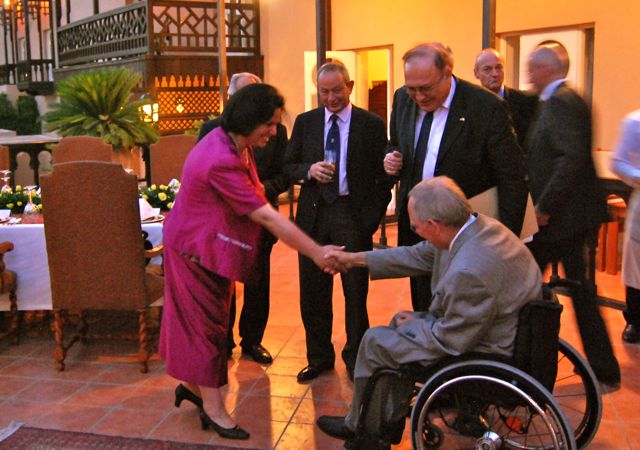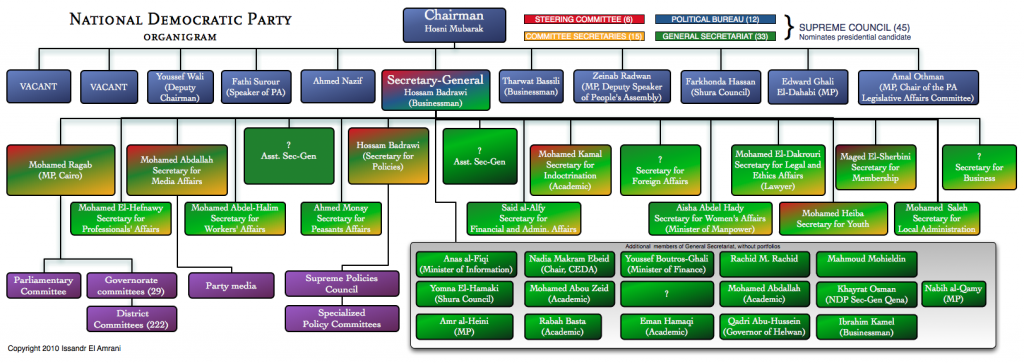München Gestern Abend überraschte Obamas Gesandter Frank Wisner die Teilnehmer der Münchener Sicherheitskonferenz mit der Aussage, Präsident Mubarak müsse im Amt bleiben, um den Übergang zur Demokratie zu steuern. Er habe hier eine einmalige Chance, sein Erbe zu bestellen. Wisner sprach gar von den 60 Jahren, die Mubarak im Dienst seines Landes verbracht habe, und auf erstaunte Nachfrage des Moderators bestätigte er, es sei seine Meinung, man müsse mit dem Regime „von innen her“ arbeiten, ohne Anklage und Feindseligkeit. Sonst bestehe die Gefahr, dass sich das Regime weiter verhärte. Mubarak solle einen Abgang in Würde bekommen.
In kürzester Zeit waren diese Bemerkungen des aus New York zugeschalteten Diplomaten über München auf den Tahrir-Platz von Kairo gelangt. Für die Menschen, die dort seit fast zwei Wochen ausharren, die Schikanen und Verletzungen und Tote zu beklagen haben, muss das wie ein Schlag ins Gesicht gewirkt haben. Entsprechend waren die ersten Reaktionen: Wisner solle seine Meinungen für sich behalten, er habe sich von Mubarak einwickeln lassen, und auf Twitter wird auch schon Wisners jüdische Herkunft verschwörungstheoretisch ins Spiel gebracht.
Die amerikanische Regierung hatte denn auch nichts Eiligeres zu tun, als sich von Wisner zu distanzieren. Seine Bemerkungen seien nicht abgesprochen gewesen und reflektierten nur seine persönliche Meinung. So einfach ist es aber nicht. Die Obama-Regierung tut sich offenbar sehr schwer, eine Position zum Wandel in Ägypten zu beziehen, und Wisners Auftritt zeigt deren Ambivalenz. Hilary Clinton sprach in München davon, dass man mehr mit der ägyptischen Zivilgesellschaft zusammen arbeiten werde. Wie das geschehen soll, wenn man zugleich an dem verhassten Diktator festhält, den diese Zivilgesellschaft um jeden Preis loswerden will, weiß sie wohl auch nicht.
Während die Menschen auf der Straße mit dem Einsatz ihres Lebens für ihre Würde aufstehen – eine Würde, die Mubaraks Regime ihnen verweigert hat – von einem Abgang in allen Ehren zu sprechen, ist eine unfassliche diplomatische Dummheit. So kann man es auch aus den Reaktionen deutscher Diplomaten hier in München lesen, die von einer „unklugen“ und „nicht zu Ende gedachten“ Intervention sprechen.
Es gibt allerdings eine realen Hintergrund für Wisners Einlassungen, der über die „realpolitische“ Sympathie für berechenbare Schweinehunde hinausgeht. Nach der geltenden ägyptischen Verfassung ist es so, dass der Präsident bestimmte Massnahmen ergreifen muss, um einen Übergang zur Demokratie zu ermöglichen. Hossein Bahgat und Soha Abdelaty erklären in der Washington Post, wofür man Mubarak noch braucht. (Darum muss man ihn allerdings nicht von einem korrupten Kleptokraten zu einem verdienten Führer umwidmen.)
Egypt’s constitution stipulates that if the president resigns or his office becomes permanently „vacant,“ he must be replaced by the speaker of parliament or, in the absence of parliament, the chief justice of the Supreme Constitutional Court. In the event of the president’s temporary inability to exercise his prerogatives, the vice president is to take over as the interim head of state. In both cases a new president must be elected within 60 days. Significantly, the constitution prohibits the interim president from introducing constitutional amendments, dissolving parliament or dismissing the cabinet.
If today Mubarak were no longer available to fulfill his role as president, the interim president would be one of two candidates. If he chooses to leave the country, say for „medical reasons,“ the interim president would be Omar Suleiman, the former intelligence chief who was recently made vice president. Egyptians, particularly those of us calling for an end to Mubarak’s three-decade rule, see Suleiman as Mubarak II, especially after the lengthy interview he gave to state television Feb. 3 in which he accused the demonstrators in Tahrir Square of implementing foreign agendas. He did not even bother to veil his threats of retaliation against protesters.
(…)
On the other hand, if Mubarak is pushed to resign immediately we would have an even worse interim president: Fathi Surur, who has been speaker of the People’s Assembly since 1990. Surur has long employed his legal expertise to maintain and add to the arsenal of abusive laws that Mubarak’s regime has used against the Egyptian people. Since neither Suleiman nor Surur would be able to amend the constitution during the interim tenure, the next presidential election would be conducted under the notoriously restrictive election rules Mubarak introduced in 2007. That would effectively guarantee that no credible candidate would be able to run against the interim president.
So before Mubarak resigns he must sign a presidential decree delegating all of his authorities to his vice president until their current terms end in September. Mubarak issued similar decrees, transferring his powers to the prime minister, when he was hospitalized in 2004 and 2009. In addition, Mubarak must issue decrees lifting the „state of emergency“ that has allowed him to suppress Egyptians‘ civil liberties since 1981 and ordering the release or trial of those held in administrative detention without charge – estimated to be in the thousands.
Die Frage ist allerdings, ob das ägyptische Volk noch bereit ist, diesen konstitutionell vorgesehenen Weg mitzugehen. Wenn Mubarak nicht bald signalisiert, dazu bereit zu sein, wird es zu spät sein. Und er macht keine Schritte in diese Richtung. Er trifft sich mit Wirtschaftsberatern und tut so, als sei er noch im Amt wie eh und je.
Wenn man die Münchener Konferenz als eines der Foren zur Selbstdarstellung des Westens ansieht, dann muss man festhalten, dass dies im Blick auf Ägypten gründlich misslungen ist. Und die Obama-Regierung hat – vor allem durch ihren Sondergesandten Wisner – daran die meiste Schuld. Jetzt setzt sich wieder einmal der Eindruck fest: Der Westen hält bis zuletzt an einem Diktator fest, was auch immer er über Menschenrechte predigt. Durch das diplomatische Desaster in München ist es unwahrscheinlicher geworden, dass Mubarak für die verfassungsmässigen Dienste zu gewinnen ist, für die man ihn noch braucht.


